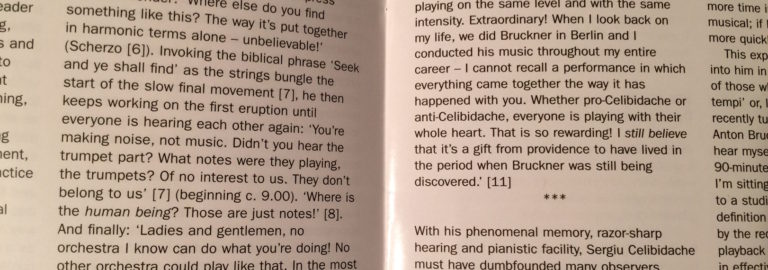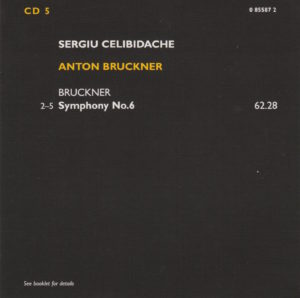 I’m still sick as a dog.
I’m still sick as a dog.
I’m listening to the symphonies, yes.
But typing up each blog is a colossal pain in the hoo-hah because my head hurts, my eyes are watering, and I can’t breathe. (Other than that, Mrs. Lincoln. What did you think of the play?)
It’s a good thing I’m doing this for my own benefit, because if this was a job, I’d resent having to do it.
This evening, I am listening to Anton Bruckner’s Symphony No. 6 in A Major (WAB 106) interpreted by the Romanian conductor Sergiu Celibidache (1912-1996).
According to one web site, his name is pronounced: SER-zhoo Chay-lee-bee-DAH-ke.
I’ll have to take their word for it.
If you want to read the background info on Maestro Celibidache (and I really think you should – he was a fascinating guy), or read my opinion of his interpretation of Bruckner’s Third, visit Day 13.
If you want to read my opinion of Celibidache’s interpretation of Bruckner’s Fourth, visit Day 19.
If you want to read my opinion of Celibidache’s interpretation of Bruckner’s Fifth, visit Day 27.
If going backward isn’t your gig, then read on…
First, the objective stuff. Then, my opinion of the performance and box set and liner notes, etc.
The objective stuff:
 Bruckner’s Symphony No. 6 in A Major (WAB 106), composed 1879–1881
Bruckner’s Symphony No. 6 in A Major (WAB 106), composed 1879–1881
Sergiu Celibidacheconducts
Celibidache used the “ed. Haas” version, according to the liner notes.
Munchner Philharmoniker (Munich Philharmonic) plays
The symphony clocks in at 65:28
This was recorded in Munich, Germany, on November 29, 1991
Celibidache was 79 when he conducted it
Bruckner was 57 when he finished composing it (the first time)
This recording was released on the Warner Classics label
Bruckner wrote his symphonies in four movements. The time breakdown of this one (Symphony No. 6 in A Major), from this particular conductor (Celibidache) and this particular orchestra (Munchner Philharmoniker) is as follows:
I: Majestoso…………………………………………………………………………………………………………17:02
II: Adagio. Sehr feierlich (Very solemnly)…………………………………………………………….22:01
III: Scherzo. Nicht schnell (Not fast) — Trio. Langsam (Slowly)…………………………..8:18
IV: Finale. Bewegt, doch nicht zu schnell (With motion, but not too fast)………..15:07
Total Time: 65:28
According to its entry on Wikipedia,
Revisions and editions
The Sixth Symphony was also first published in 1899, a task overseen by Cyrill Hynais, a former student of Bruckner. However, this edition encompassed a few minute changes from Bruckner’s original score, namely the repetition of the second half of the Trio in the third movement. The next edition was printed only in 1935, edited by Robert Haas, and is the edition most commonly performed today.
Okay. Now, here are the subjective aspects:
My Rating:
Recording quality: 5
Overall musicianship: 4
CD liner notes: 3 (thin booklet mostly about Celibidache, with a wee bit about Bruckner, translated into English, German, and French – fascinating for me, but unfulfilling as a primer on Bruckner’s symphonies)
How does this make me feel: 5
I just noticed what could be a major flaw in the CD booklet: there are numbers that, I assume, were meant to refer to footnotes.
But there are no footnotes.
Look:

See the numbers in brackets on the left? There’s a [6], two [7], an [8], and – on the right – an [11].
Are those reference numbers?
If so, to what do they refer?
Beats me.
I looked through the booklet a dozen times. I could find no source for those numbers.
No footnotes!
Those footnote numbers look like the ones found on Wikipedia. Only there one can find footnotes at the other end of them, a source for the information above.
Not so in this CD booklet.
Is that a major faux pas?
I’d say so.
Moving on…
I’ll repeat something I mentioned in a previous review: the lack of information on the back of the CD sleeves. Bugs the crap outta me.
 Take a look at what can be discerned from reading the back of CD 6 from the Celidibache box set:
Take a look at what can be discerned from reading the back of CD 6 from the Celidibache box set:
The number of the CD
The name of the conductor
The name of the composer
The name of the symphony
The total running time of disc
And “See booklet for details” in italic.
Since Warner Classics had to (and did) print something on the back of the CD sleeve, would it really have killed them to include:
The track names and running times for each?
The version Celibidache used?
The name of the orchestra?
The name of the record label?
Despite that growing list of bugs-the-crap-outta-me issues I have with this box set, I have to say…
“Huzzah!”
This was a magical performance!
It had everything going for it that I want going for a recorded symphony:
Depth
Space
Energy
Clarity
Dynamics
Power
The first movement and the Scherzo were particularly good.
But I enjoyed the entire performance, with a special nod to the roller coaster ride that is the Finale. I haven’t heard a performance that captivating in a long time. It runs the gamut from a whisper to an atom bomb. Powerful doesn’t even begin to capture it.
Highly recommended.
